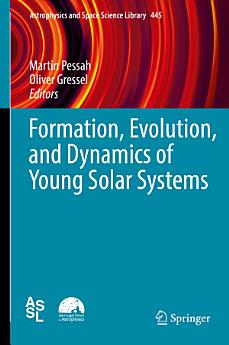Formation, Evolution, and Dynamics of Young Solar Systems
Martin Pessah · Oliver Gressel
Dec 2017 · Astrophysics and Space Science Library Book 445 · Springer
Ebook
374
Pages
reportRatings and reviews aren’t verified Learn More
About this ebook
This book's interdisciplinary scope aims at bridging various communities: 1) cosmochemists, who study meteoritic samples from our own solar system, 2) (sub-) millimetre astronomers, who measure the distribution of dust and gas of star-forming regions and planet-forming discs, 3) disc modellers, who describe the complex photo-chemical structure of parametric discs to fit these to observation, 4) computational astrophysicists, who attempt to decipher the dynamical structure of magnetised gaseous discs, and the effects the resulting internal structure has on the aerodynamic re-distribution of embedded solids, 5) theoreticians in planet formation theory, who aim to piece it all together eventually arriving at a coherent holistic picture of the architectures of planetary systems discovered by 6) the exoplanet observers, who provide us with unprecedented samples of exoplanet worlds. Combining these diverse fields the book sheds light onto the riddles that research on planet formation is currently confronted with, and paves the way for a comprehensive understanding of the formation, evolution, and dynamics of young solar systems.
The chapters ‘Chondrules – Ubiquitous Chondritic Solids Tracking the Evolution of the Solar Protoplanetary Disk’, ‘Dust Coagulation with Porosity Evolution’ and ‘The Emerging Paradigm of Pebble Accretion’ are published open access under a CC BY 4.0 license via link.springer.com.
About the author
Martin Pessah is a Professor at the Niels Bohr International Academy at the Niels Bohr Institute, University of Copenhagen. His research interests span a broad range of subjects in plasma astrophysics, astrophysical fluid dynamics and magnetohydrodynamics; these include fundamental aspects of accretion physics in young starts and compact objects, the interstellar medium, and the intracluster medium in galaxy clusters.
Oliver Gressel is an Assistant Professor at the Niels Bohr International Academy in Copenhagen. He received his PhD in Astrophysics from the University of Potsdam in 2009, and is known for his outstanding work in the area of mean-field magnetohydrodynamics and dynamo theory, for which he received the 2015 Johann Wempe Award. His research interests include magnetic turbulence in the interstellar medium and in protoplanetary discs and the influence of the ensuing perturbations on the formation of stars and planets.Rate this ebook
Tell us what you think.
Reading information
Smartphones and tablets
Install the Google Play Books app for Android and iPad/iPhone. It syncs automatically with your account and allows you to read online or offline wherever you are.
Laptops and computers
You can listen to audiobooks purchased on Google Play using your computer's web browser.
eReaders and other devices
To read on e-ink devices like Kobo eReaders, you'll need to download a file and transfer it to your device. Follow the detailed Help Center instructions to transfer the files to supported eReaders.







